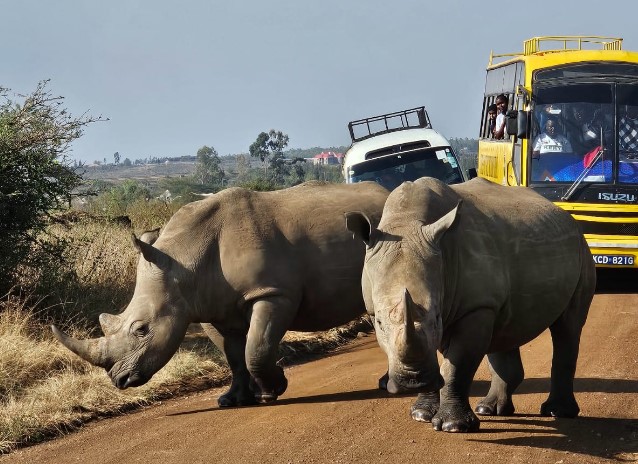Alarm as wildlife populations decline by 73 per cent due to climate change

In the period under review, freshwater populations suffered the heaviest declines, falling by 85 per cent.
The average global size of monitored wildlife populations has declined by 73 per cent in just 50 years, a new study has shown.
Titled the '2024 Living Planet Report' by the World Wildlife Fund (WWF), the research has called for immediate action in countries that host the more than 5,000 monitored species of amphibians, birds, fish, mammals and reptiles.
More To Read
- Tourist numbers surge in Mombasa as direct flights, new commuter rail boost arrivals
- Kenya sees major boost from visa-free policy as tourist numbers hit 1.8 million
- Counties intensify pressure on national government over park revenue-sharing model
- Wildlife traffickers arrested in Laikipia as police seize 18kg of elephant ivory worth Sh3.6 million
- Lewa, KWS launch vulture tracking project to boost raptor conservation
- Garissa leaders oppose wildlife relocation, demand revival of dormant game reserves
It attributes the decline to substantive nature loss and climate change, while at the same time calling for urgent enhancement of conservation measures.
In the period under review, freshwater populations suffered the heaviest declines, falling by 85 per cent, reflecting the impact of pollution of waterways.
This was followed by terrestrial populations that include families of lions, zebras and wild dogs, which declined by 69 per cent while marine populations declined by 56 per cent.
In Kenya, there have been ongoing concerns about the declining population of wildlife, particularly the big five — lion, leopard, rhino, elephant, and buffalo.
While there is no specific data on the exact numbers, the government initiated a wildlife census in June this year to gather accurate information on the populations of all aquatic and land-based wildlife species across the country.
The developments have also triggered the government, through the Ministry of Tourism and Wildlife, to come up with a strategic plan to address the concern.
To implement the plan, the ministry early this month announced that it would need a budget amounting to Sh98 billion.
Nearing extinction
The plan detailed that over the past five decades, wildlife populations in Kenya have steadily declined, with some species nearing extinction.
It also outlines measures to halt this decline, emphasising the ongoing threats from poaching and loss of habitat.
"The population of wildlife in Kenya has declined steadily over the past five decades. With some species almost becoming extinct, the Kenya Wildlife Service (KWS) has put in measures to stop this decline. However, with poaching and reducing space for wildlife, the populations are still under threat," the plan reads.
The WWF report makes clear that a huge collective effort will be required over the next five years to tame the declining wildlife population.
The report's findings further show that food production is the primary driver of habitat loss and is depleting water resources, accounting for 70 per cent of water use.
WWF emphasises that addressing this concern requires clear solutions, starting with the need to restore ecosystems and preserve biodiversity, which they consider the most effective approach.
"We have to reduce emissions apart from breaking free from fossil fuels. Nevertheless, another vital part of the solution is finance," it says.
The report emphasises the need to redirect finances away from harmful and towards sustainable activities, noting the current economic systems fail to prioritise the well-being of people and the environment, but the shift is possible and now more needed than ever before.
"The good news is that money is available, but it must be urgently reallocated to accelerate the green and just transition of companies, and stop harming our planet Earth. Right now, the consequences of inaction are putting our own society at risk of collapse."
Wildlife is a significant contributor to the tourism industry worldwide, playing a vital role in countries' economic growth strategies by generating foreign exchange, creating jobs, and stimulating economic development.
In Kenya for instance, the travel and tourism sector contributed Sh1 trillion to Kenya's economy in 2023, according to the latest report by the World Travel & Tourism Council (WTTC).
The 2024 Economic Impact Research termed the performance as a record-breaking year for travel and tourism in Kenya.
Top Stories Today
















































